This story is published in partnership with Ozarks Alive, a cultural preservation project led by Kaitlyn McConnell.

SPRINGFIELD — “The Boy with a Drum” began a cadence that never quit.
More than 50 years ago, the little boy in its pages led the way for dozens of children’s books and generations of young readers to follow.
It was written, however, by the real one with the drum: author David Harrison, whose hands, head and heart have brought imagination to life in the minds of young readers in an industry that takes persistence, but never familiarity.
“I still get rejected all the time. You just have to stay with it,” says Harrison of his publishing efforts. “Once in a while, something will take off and you wonder where that came from. It wasn’t there when you started. Is it the mind putting together bits and pieces of what it knows, and making them add up to some new thought? I’m not sure, but it’s just there. I take it as a lucky gift.”
For much of his life, words were a source of continuity for Harrison, who moved through multiple identities. He was a trombonist, and then a scientist, and a greeting card editor whose employees declared him “an ‘OK’ guy in our book” on a plaque that now hangs in his office.
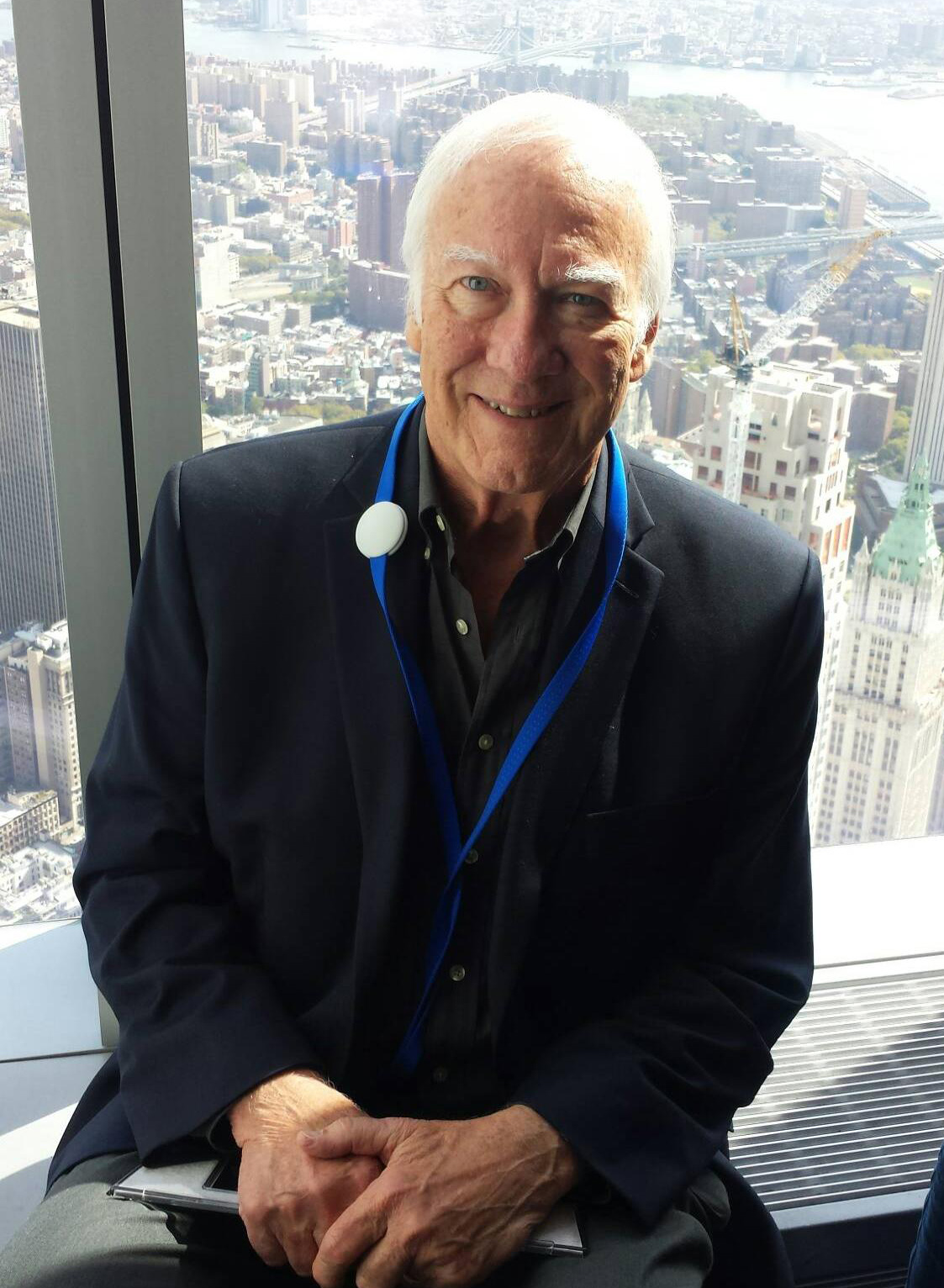
Later, he managed Glenstone Block Company, a Springfield-based family business that he took over in 1976 — a career that brought on a real-life case of writer’s block.
As the spectrum of time has shifted, so have dark nights of writing for the light of day. But words remain, stories still sketched out on big yellow legal pads.
Animals are often the characters in his books, filled with prose and poetry, and fueled by his own childhood fascinations. Yet a new book soon joins the shelf to tell of self: “This Life,” Harrison’s autobiography, will look back while looking forward.
“This Life,” Harrison’s autobiography, is available for $26.95 and may be preordered here.
Early years
Harrison, now 85, began his life in Springfield just as streetcar service was on its way out of town. He was born at Burge Hospital, which today is part of CoxHealth and exists as Cox North Hospital.
The family lived in Springfield until Harrison was around 5. At that time, his father took a job with the Phelps Dodge Corporation, a mining operation, and they moved to Arizona.
“We lived in a very interesting house — quite small,” he recalls. “It was built on a sloping lot, so that the front had stilts under it. It was a great place to crawl in under and find things, and I did. Centipedes, and tarantulas and scorpions. I kept my mother semi-hysterical half the time.”
When Harrison was in third grade, the family returned to the Ozarks. Harrison attended Oak Grove School (today headquarters of the Junior League of Springfield) and ultimately graduated from today’s Central High School in 1955.
Back then, it wasn’t the city’s only high school: Lincoln High School, now part of the Ozarks Technical Community College, was attended by African-American students.
“I was in high school when integration occurred,” says Harrison. “We were finally able to go to school with friends we played with all the time. Most of the Black students chose to remain at Lincoln — that was their school. But those who chose to come over to Central did. That was a moment in history I was privileged to witness.”
Besides integration, other key moments for Harrison’s life occurred before he walked across the stage to receive his diploma. One was the beginnings of a creative side, fueled by a love of playing the trombone. Then there was another love: Sandra Kennon, whom he met in Spanish class.
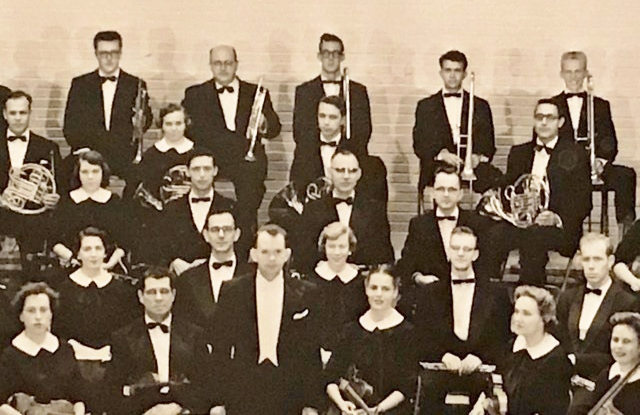
Those ties led to little distance after high school graduation. Harrison held the role of principal trombonist with the Springfield Symphony Orchestra. He also enrolled at today’s Drury University, where he began a study of biology and zoology. The across-the-street distance from Central kept him close to Kennon, whom he wed in 1959.
While the study of science was ongoing in his mind, another fascination began to develop after he took a writing class his senior year. It was at the suggestion of a professor, part of his well-rounded liberal arts education.
The class finished that semester, but its conclusion launched a beginning rather than an end.
“Because I was in that writing class,” Harrison says, “I discovered that maybe I could be a writer.”
Off to Atlanta
The same professor who spoke of the writing class suggested Harrison continue his education at Emory University in Georgia, where he pursued and graduated with a master’s degree in parasitology.
Before that happened, however, life came along through Robin, the Harrisons’ first child, who was born while her father was still in school. Unfortunately, a series of birth complications led to significant debt for the young family.
“I began frantically looking around for work, and nobody cared that I was an expert on a rat tapeworm,” he says.
Eventually Mead Johnson, a lab in Indiana, caught his attention, but didn’t have any openings in parasitology.
“But they did have one in pharmacology. Could I handle that? Sure,” recounts Harrison with a laugh. “I’d never had a class in pharmacology but I was a quick learner and had a lot of other stuff that kind of applied. So they hired me and I did well.”
It was a whirlwind time. Harrison worked during the day, studied for his job in the evening, and then wrote at night.
“Later, when Sandy was asleep and Robin was down, I would sit at a little desk I had from when I was kid, at the foot of the bed in our bedroom. Being as quiet as I could, I would try to scratch out a story. I wasn’t selling much. I wasn’t thinking about writing for kids. I was definitely a short-story writer, had a novel in mind, but I was strictly writing for an adult audience.
“I sold a story here and there, but I just wasn’t going anywhere, and little by little, the need to write became like one of those tapeworms I’d been studying. I really needed to publish.”
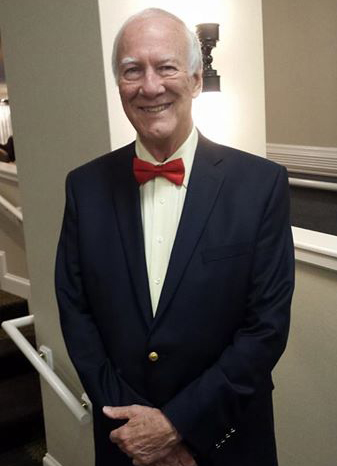
With the support of his wife, Harrison began thinking of ways he could work in the writing world. The frustrated writer couldn’t shake the feeling that words were in the cards. Turns out, it was — literally.
In 1963, he was hired as a children’s editor at Hallmark Cards.
“Writing had become important enough to me that I decided to make a change into a field that would provide a more encouraging atmosphere for writing,” he told a Sunday News and Leader reporter in 1966.
How the job came true was a twist of fate. Harrison had applied with Hallmark and, on a visit to the Ozarks, he contacted the Kansas City company and asked if he might come up and visit while he was in the area.
What he didn’t know then was that a letter was waiting for him in Indiana from Hallmark, and it contained a sentiment far less encouraging than the ones they typically printed. The rejection letter arrived before he left for Missouri, but he didn’t know it.
“That's why they had me come up (to Kansas City),” says Harrison. “They couldn’t believe they’d turned me down and I still called them. So they thought, ‘This guy really wants to work.’ I would never have done that. I’m not that kind of guy. So it was a complete fluke.”
Making a mark at Hallmark
Taking the post with Hallmark in 1963 introduced Harrison to a whole new world, one geared toward communicating with children. He soon had two of his own — after Robin, son Jeff arrived — but the role helped put building blocks (but not yet not concrete) in place to understand more about reaching a younger audience.
“I select all writing to be used as sentiments,” he told the News and Leader reporter. “I am involved in selecting the size of the card, the kind of paper to be used, the design situation of the card and the style of the artwork to be used. My aim in doing this is to develop a line of cards well-balanced in sentiment, appearance and design.
“I have to consider not only the youngster who eventually will receive the card, but also the adult who is going to buy it. It’s a very tricky thing.”
In this period of life, two key moments occurred: Harrison read a book by famed poet Karl Shapiro, which inspired musings over whether he should try to write poetry. He also won a scholarship contest through Reader’s Digest, sending him to a summer writing workshop.
While there were influential writers at the session, including novelists Kurt Vonnegut and Harry Mark Petrakis, a newspaper article and subsequent phone call after the fact made the greatest difference for his future. One day, a random woman called with a seemingly simple question, yet life-changing answer: “Do you write for children?”
He said no. But he thought about it. And then he did.
The conversation led him to write and send a manuscript to Western Publishing, a company responsible for publishing the Little Golden Books series. They liked it.
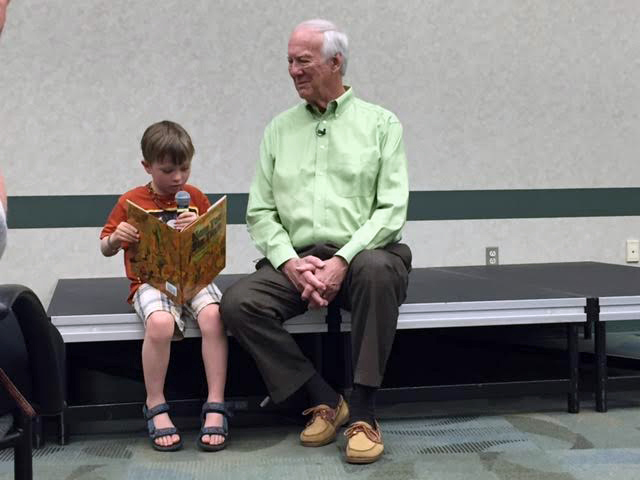
“They offered me $300 for my story. I was blown away by it,” says Harrison. “I had been getting paid $75 for a story, and all of a sudden it was a $300 paycheck.
“I sold it outright — I didn’t know about royalties and things like that. They owned the story and they sold 2 million copies of it.
“But what I had was a book.”
“The Boy with the Drum” came out in 1969, leading to others and quick recognition for Harrsion. His second book was featured on children’s TV show “Captain Kangaroo,” he says, and was read on the program.
“I thought, ‘Woah, this is kind of fun!’”
“The Book of Giant Stories,” Harrison’s third book, which features villains coming around to good, won a Christopher Award in 1972. According to the award’s website, it was established in 1949 by Father James Keller to salute media that “affirm the highest values of the human spirit.”
“The main thing was that I loved doing it. I got so much more joy from writing for young people. I guess I never looked back much after that.”
Home to Springfield
Harrison continued his personal writing efforts while working during the day for Hallmark, amassing a list of 18 books by February 1973, six of which were set to be published in the following months.
That fact was shared in a Springfield newspaper article, which also announced something else: Harrison and his family had returned home to the Ozarks, and he joined Glenstone Block Company as its vice president and general manager. It was an occupation he stayed with through its sale in 2008, becoming its top leader in 1976.
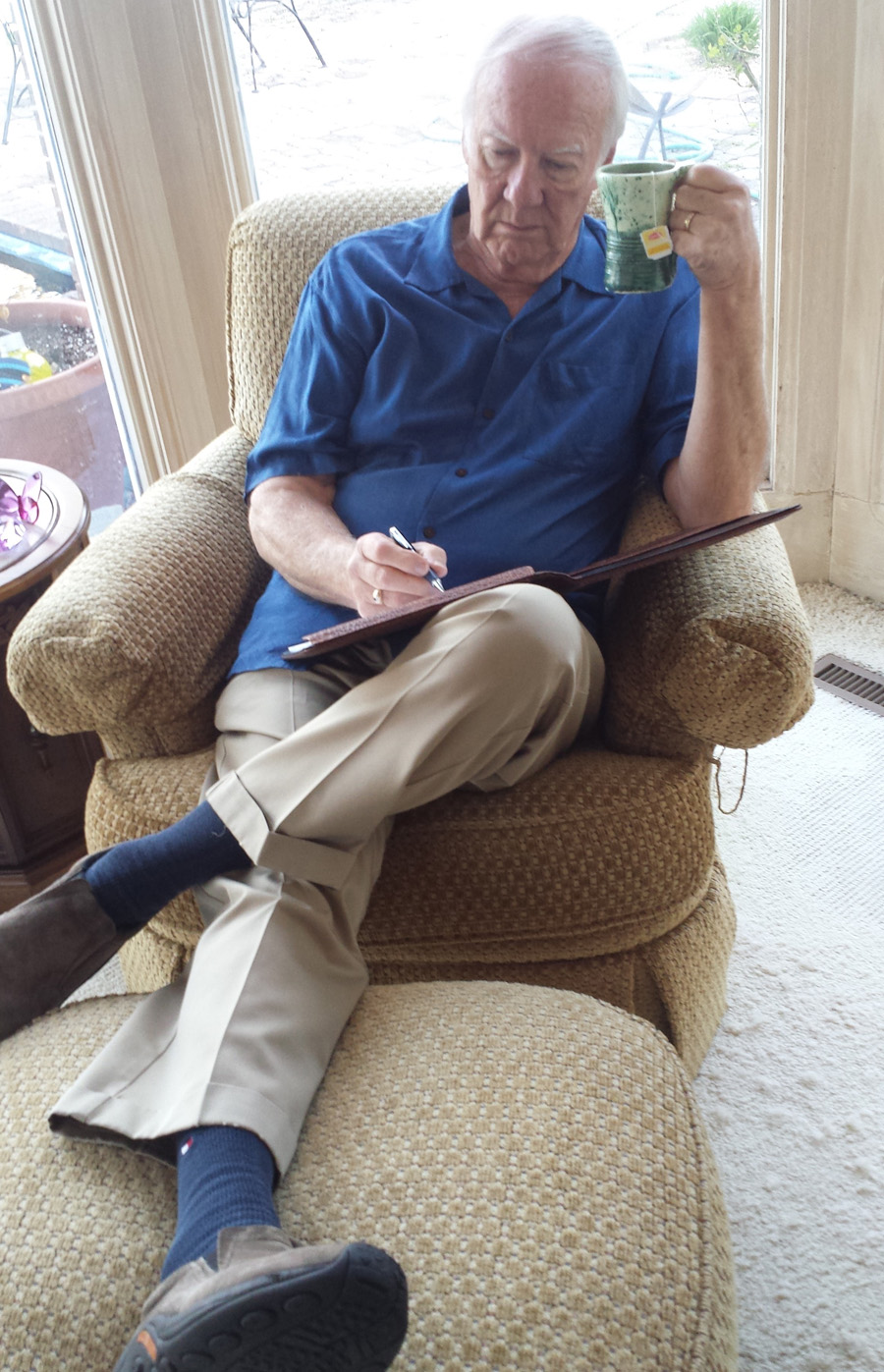
Having a day job relieved pressure that would come with pursuing a passion full-time — “I don’t know how I’d respond to that pressure,” he said more than 40 years ago — but it also offered a challenge with regard to time, which was limited.
He found it in evenings, often from 8 p.m. to midnight, and quiet moments that could be filled with productivity.
“You can’t just sit and do nothing — nothing will happen,” he told a Springfield newspaper reporter in 1981. “Discipline is the first ingredient.
“So, if ‘nothing is happening,’ he may take a pad and pencil and ‘scratch off ideas,’” the article continued. “Or he may write a poem. ‘Occasionally something like that will develop into a story,’ he said.”
At that point, the article noted, he had published more than 30 books, three of which had sold more than a million copies each, and some translated into eight languages. There were his original titles, as well as those around popular cartoon characters, such as the Pink Panther (about which he wrote three books) and Bugs Bunny.
In many cases, ideas grew from fragments, planted through moments of interest and, in some cases, everyday life.
“You’re always operating on more than one level,” Harrison said in 1989. “If you’re in the business of finding ideas, you find them everywhere.
“At one level, your subconscious is always tuned into what’s going on and alert to the possibility this could lead to something.”
Today, he echoes similar sentiments.
“Once in a while, I’ll know the whole story, but when I do, I’m a little bit fearful of it because I’m not sure I want to know the whole story when I start,” he says. “I don’t want to have a closed mind that might miss a really great turn to the right. I think my best work has been work that evolves.”
Investment in the future
Writing, concrete-block-building and eventually having adjacent ownership to Gamble’s Gifts (as of 1984) were not all Harrison did during this time of life: In 1982, he ran for a spot on the Springfield Public Schools Board of Education.
“Our Springfield system is already a good one,” he said in a newspaper Q&A in the runup to the election. My concern is not so much with its current status as with its future. The greatest asset of any organization is its people. We depend on our school employees for the educational welfare of our children.”
He was elected, and began a six-year stint on the board, which eventually led to his place as president. It was a contentious period faced with discussions of exclusive representation and litigation. However, while working through challenges, brighter moments shone in service to the district’s future by his speaking with school kids about writing.
“Harrison encouraged the children to search newspapers, cartoons, and even other books for ideas. He then told the students that people are what they write,” noted a Springfield newspaper article from May 1982, when Harrison visited students at Shady Dell Elementary.
“There is a lot of yourself in what you write,” Harrison told the students. “You put a lot of your opinions, attitudes, and philosophy in what you write.”
While Harrison said through the paper that he hoped the visit helped encourage kids’ interest in books, it also offered another benefit:
“The real point is that it refreshes my feelings about kids. It keeps me tuned to what the young market is like. I try and imagine what second- and fifth-graders are thinking.”

Impact on kids
That intentionality in connecting with students is something seen by Stephanie Smallwood, who first utilized Harrison’s work years ago as an early childhood educator.
“Some of the most important things we can do for kids, especially authors and illustrators, is to create these materials that children are excited about,” says Smallwood. “That’s the key piece. If we have a world where kids are always having to read books that don’t really speak to them, or they aren’t really interested in, or they don’t see themselves in — that’s not going to draw their attention the way that it has to for their brains to react to what learning to read actually is.
“The more special we can make that process by finding books for kids that they are truly connecting with, the better. That’s where David really fills that niche.”
Today, Smallwood works with Harrison on a regular basis in her role as youth services coordinator for the Springfield-Greene County Library District. In fact, she spoke with him the same day as she discussed his work with Ozarks Alive: The duo is planning a program in Spring 2023 on sounds heard at night.
In addition to adapting, Smallwood points to Harrison’s work in both poetry — in some cases, its lyrical nature and length make it more easily accessible for readers — and nonfiction, which appeals to readers who are more interested in learning something from what they read.
“The other thing that David does really, really special — especially his more recent works — is blending poetry with nonfiction. With facts. When it comes to anyone who is working with kids and books, we know that not every kid loves fiction. They’re not all fiction readers. Actually, adults are not either, but we just kind of forget that. When we think about kids reading, we think of novels. Well, there are lots of kids and adults who actually prefer nonfiction. They want to learn real things. They want to learn facts.
“They’re able to reach those kids who enjoy nonfiction while giving them some more lyricism, while still encouraging them to use different comprehension skills than we use when we read just pure prose nonfiction. It really challenges those comprehension parts of the brain, whether we’re reading it ourselves or having it read to us.”

The work isn’t done
For more than a third of his life, the Harrisons have lived within Springfield’s Southern Hills neighborhood in a home he and his wife custom-built some 33 years ago.
One space is an office, filled with mementoes, that reminds of moments along the way.
“When my first book came out, Sandy bought me that Steuben glass brontosaurus as a gift,” Harrison says of a dinosaur that sits on a shelf across from his desk.
He’s served and started a variety of civic endeavors to help support literacy and kids’ love of reading, including helping found the Foundation for Springfield Public Schools; Reading Roundup, which helped supply library districts with books; and Missouri Writes for Kids, a program designed to help children read the work of the state’s authors. It eventually expanded into America Writes for Kids.
In the early 1990s, he helped begin The Write Choice, a meetup of students with people who wrote for a living or hobby. He led the creation of “What I’ve Learned So Far,” a book sponsored by Foundation for SPS, that was filled with student and teacher contributions. He even convinced a former Springfield mayor to proclaim 1994 and ‘95 the Year of the Writer.
The list goes on and on — so much so that News-Leader columnist Sarah Overstreet wrote in 1998 of his big heart and aspirations and requirements for realization.
“Most of us who know and love David — and you can’t help but love him because he’s always doing something wonderful for someone — often hide under our desks when we hear the phone call is from him,” Overstreet wrote, a light tone in her text.
Awards, too, point to success: He has honorary doctorate of letters degrees from Missouri State University and Drury University, the latter for which he has served as poet laureate since 1983.
A page on Drury’s website lists the designation, and speaks to its responsibilities, which include working with the School of Education and Child Development staff and administration around virtual interaction with students in schools beyond the area, and speaking to Drury senior or graduate classes about children’s literature and poetry.
Despite its serious nature, John Moore, former president of Drury, recalls a contrasting moment when he knew Harrison would be right for the role. It was at a university awards banquet in the early 1980s, which Moore says had gone on for quite a long time, and featured a number of speakers until the last one took the stage.
“He began speaking and went on for at least 20 minutes or more droning on about his life and business seemingly without a point or end. We were all fidgeting, eager for the evening to conclude,” recalls Moore of the speaker.
Harrison was there, too, with humor in tow.
“Not one to let an inspiration escape, (David) began scratching out a doggerel poem about how bored everyone was and how we were all near the point of peeing in our pants,” Moore says. “He shared it with me and I immediately dubbed him Drury's poet laureate.”
It’s a role he’s now held for nearly 40 years.
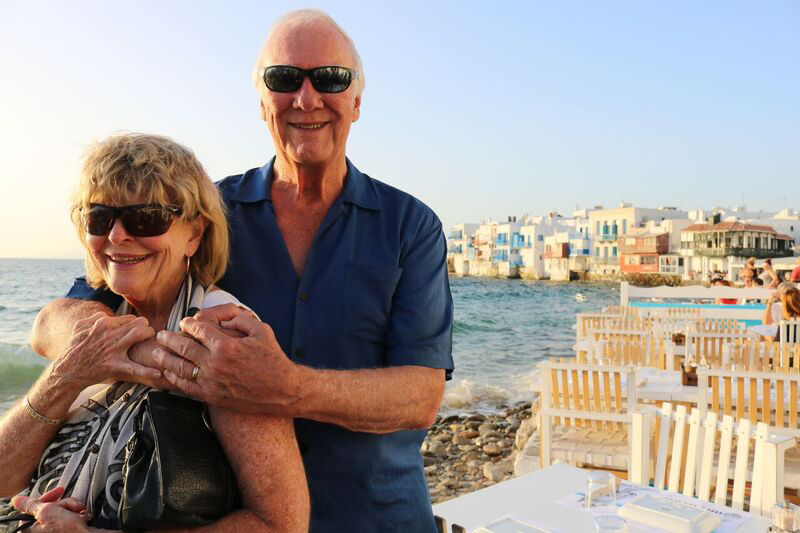
Harrison regularly writes on his blog, covering personal news, developments and thoughts. In addition to student sessions already mentioned, he’s given more than 300 keynote talks and presentations, including one recently in Kansas City for professional writers at The Writers Place, which supports the local literary community.
And, at least 40 years after he walked through his first set of doors to visit students, Harrison still visits schools.
“I've never stopped writing. I've never stopped going into schools,” he says, speaking of the following morning, when “at 10 minutes after eight, I'll be reading to first graders at Harrison Elementary.”
The school was named in his honor in 2009. He points to a photo from March, when he visited the school on his 85th birthday, complete with a kid-friendly truck-covered tie.
“That was given to me … when I started the teacher appreciation banquet many years ago,” says Harrison. “So I wear that tie every year to the banquet. I also wear it on other special occasions.”
Books are still in progress, too. But one returns to the adult audience he originally set out to reach. It’s “This Life,” Harrison’s autobiography, which is set to be released in the coming weeks. It’s published by the Ozarks Studies Institute, an initiative of Missouri State University Libraries.
While the book speaks to an Ozarker’s success, it’s also about connecting dots of nostalgia and the memories children’s books can bring back for adults.
Tom Peters, dean of MSU Libraries and leader of the OSI, gives an example from his own life, when once looking through picture books he read as a child was as evocative as smelling the scent of his great-aunt’s perfume.
“His body of work probably has staying power long after he’s gone,” says Peters of Harrison. “I think it’s type of accomplishment that has amazing momentum.”
“I think this is another instance of an Ozarker who ‘done good.’”
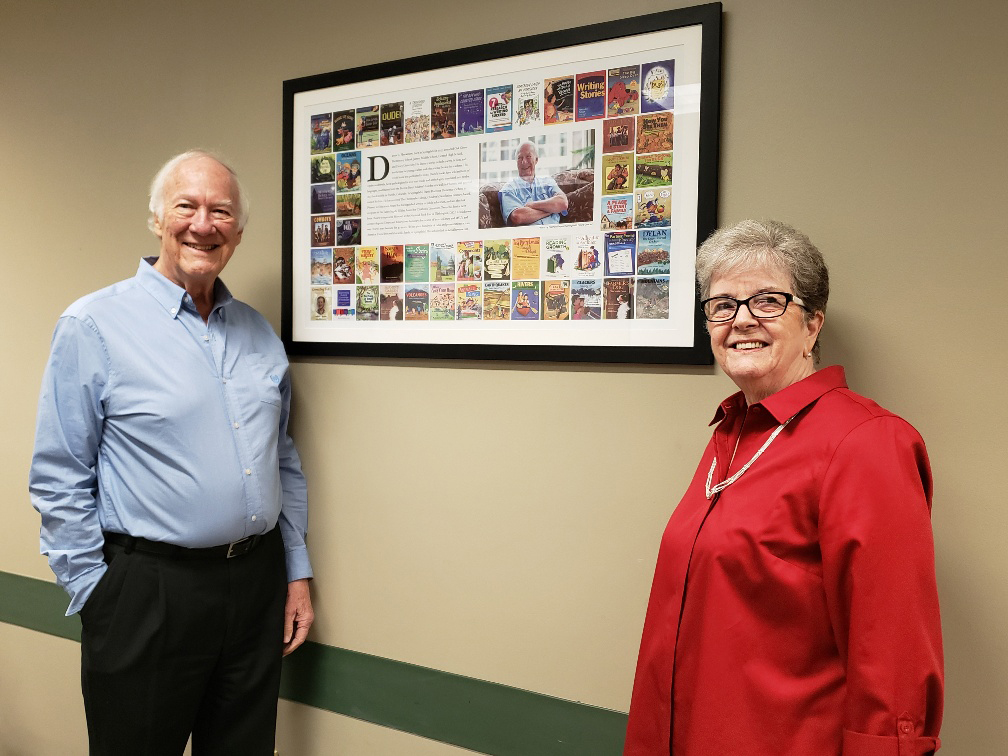
The idea for the autobiography initially began as a work for the stage after Harrison attended a one-man presentation. Eventually, however, he decided to revert to what he knows best — books — and commenced writing.
“I began to remember these things, these times, these moments in my life, that might have influenced me, the writer,” says Harrison. “I had to leave out a lot of stuff that I wanted to include, but they didn't contribute, in my judgment.
“Time will tell if anybody cares. For those who are interested in writing, particularly for writing for young people, I suppose there can be an audience. Plus, I like to hope I have a few fans out there who might also be interested enough to read it. I don't think there's a chance that I'll sell a lot of copies.”
That book perhaps won’t be the same indicator of success as others he has penned. He points to “The Dirt Book: Poems About Animals That Live Beneath Our Feet,” a book of his poetry which recently was chosen to be on the Texas Bluebonnet Award Master List.
“That kind of success makes me think I’ve done what I wanted to do.
But “I’m not through doing it.”
“This Life,” Harrison’s autobiography, is available for $26.95 and may be preordered here.

